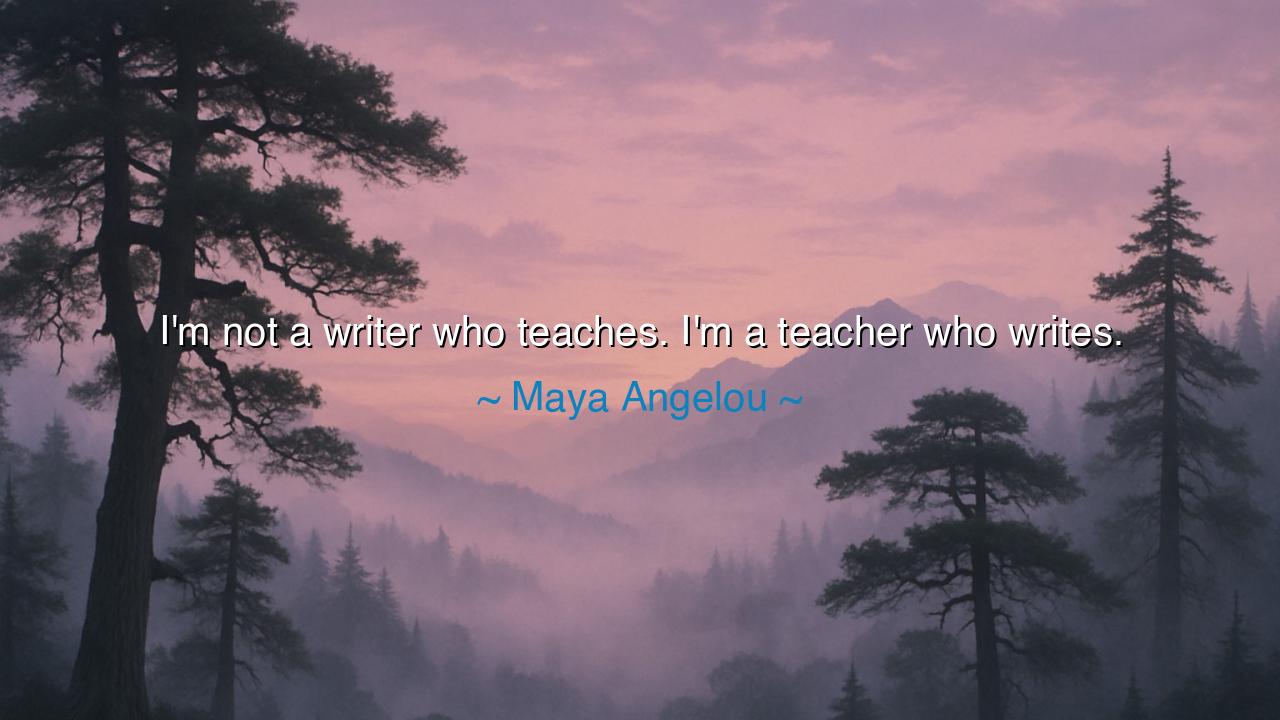
I'm not a writer who teaches. I'm a teacher who writes.






Maya Angelou, the great voice of wisdom and resilience, once spoke with the clarity of a prophet: “I’m not a writer who teaches. I’m a teacher who writes.” In this saying, she reveals not only her own calling, but a truth about the nature of vocation itself. The writer crafts words to delight, to move, to record. But the teacher—the one who carries light into darkness—uses words as instruments of transformation. Angelou did not see herself first as one who placed ink upon the page, but as one who sought to awaken souls. Writing was not her identity’s core, but an extension of her greater mission: to teach.
The ancients would have understood her well. For in their eyes, the highest art was not the poem, but the wisdom the poem carried. Homer sang not for mere music, but to teach men courage, honor, and humility. Confucius wrote not for literary glory, but to shape societies with virtue. Even Plato, whose dialogues are treasures of philosophy, wrote as a teacher to guide minds upward toward truth. Angelou’s words place her in this noble lineage: her writing was a vessel, but her essence was the teacher’s spirit.
Her life itself embodied this truth. She lived as dancer, singer, poet, activist, and actress, yet in all these roles, she was above all a teacher. She taught not always in classrooms, but in how she lived, how she endured, how she lifted others. Her memoir, I Know Why the Caged Bird Sings, was not merely literature but a classroom of human resilience, a lesson in dignity against cruelty, a manual for the oppressed to rise with song rather than silence. Every page was instruction, every poem a lecture in courage, every story a lesson in love.
History offers us another reflection in the life of Marcus Aurelius, the Roman emperor and philosopher. Though he wrote the Meditations for himself, not for fame, his words have taught generations how to live with virtue and calm in the face of suffering. Like Angelou, he was not a writer who happened to teach; he was a teacher whose writing became a beacon. Such figures remind us that true authority does not come from artistry alone, but from the deeper mission of passing wisdom from one heart to another.
The meaning of Angelou’s words is also a reminder of humility. She did not claim the title of writer first, though her literary works are celebrated across the world. She chose instead the title of teacher, for teaching, in her vision, is service. A writer may seek personal voice, but a teacher seeks the good of others. To call herself a teacher who writes is to declare that her words exist not for her own glory, but for the enlightenment of her readers. Her writing was her classroom, her readers her students, and the lessons she offered were courage, compassion, and truth.
The lesson for us, then, is to recognize the higher purpose of our gifts. Whatever talents we possess—be it speaking, writing, building, or creating—let them serve as instruments of teaching. The world is in need not only of artists, but of artists who teach; not only of leaders, but of leaders who instruct by example; not only of workers, but of workers who pass on their craft with generosity. To live as a teacher is to live for the benefit of others, and in that service, one finds the highest honor.
Practically, this means asking yourself: What am I teaching by the way I live? Even if you are not in a classroom, you are always instructing—through kindness or cruelty, through patience or haste, through generosity or selfishness. Let your work, whatever it is, carry a lesson worth passing on. And if you write, let your words not only shine with beauty, but also kindle understanding. For, as Angelou shows us, the noblest calling is not to adorn the world with words, but to guide the world with wisdom.
Thus, Maya Angelou’s declaration resounds across time: “I’m not a writer who teaches. I’m a teacher who writes.” Take these words as counsel for your own journey. Do not cling to titles or to pride in your craft. Instead, embrace the deeper calling: to teach by your words, your actions, your life itself. For in the end, all true greatness is not in creation alone, but in the passing on of light to those who follow.






AAdministratorAdministrator
Welcome, honored guests. Please leave a comment, we will respond soon